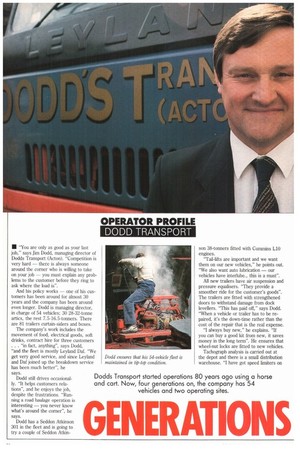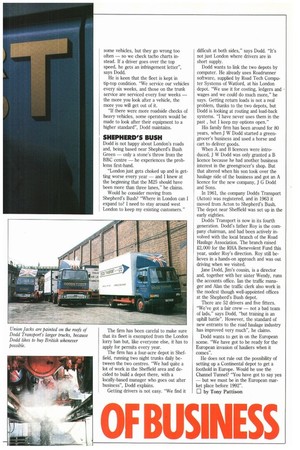GENERATIONS OF BUSINESS
Page 52

Page 53

If you've noticed an error in this article please click here to report it so we can fix it.
Dodds Transport started operations 80 years ago using a horse and cart. Now, four generations on, the company has 54 vehicles and two operating sites.
• "You are only as good as your last job," says Jim Dodd, managing director of Dodds Transport (Acton). "Competition is very hard — there is always someone around the corner who is willing to take on your job — you must explain any problems to the customer before they ring to ask where the load is".
And his policy works — one of his customers has been around for almost 30 years and the company has been around even longer. Dodd is managing director, in charge of 54 vehicles; 30 28-32-tonne artics, the rest 7.5-16.5-tonners. There are 81 trailers curtain-siders and boxes.
The company's work includes the movement of food, electrical goods, soft drinks, contract hire for three customers
Dodd still drives occasionally. "It helps customers relations", and he enjoys the job, despite the frustrations. "Running a road haulage operation is interesting — you never know what's around the corner", he says.
Dodd has a Seddon Atkinson 301 in the fleet and is going to try a couple of Seddon Atkin son 38-tonners fitted with Cummins LbO engines.
"Tail-lifts are important and we want them on our new vehicles," he points out. "We also want auto lubrication — our vehicles have interlube., this is a must".
All new trailers have air suspension and pressure equalisers. "They provide a smoother ride for the customer's goods". The trailers are fitted with strengthened doors to withstand damage from dock levellers. -This has paid off," says Dodd. "When a vehicle or trailer has to be repaired, it's the down-time rather than the cost of the repair that is the real expense.
"I always buy new," he explains. "If you can buy a good kit from new, it saves money in the long term". He ensures that wheel-nut locks are fitted to new vehicles.
Tachograph analysis is carried out at the depot and there is a small distribution warehouse. "I have got speed limiters on some vehicles, but they go wrong too often — so we check tacho charts instead. If a driver goes over the top speed, he gets an infringement letter", says Dodd.
He is keen that the fleet is kept in tip-top condition. "We service our vehicles every six weeks, and those on the trunk service are serviced every four weeks — the more you look after a vehicle, the more you will get out of it.
"If there were more roadside checks of heavy vehicles, some operators would be made to look after their equipment to a higher standard", Dodd maintains.
SHEPHERD'S BUSH
Dodd is not happy about London's roads and, being based near Shepherd's Bush Green — only a stone's throw from the BBC centre — he experiences the problems first-hand.
"London just gets choked up and is getting worse every year — and I knew at the beginning that the M25 should have been more than three lanes," he claims.
Would he consider moving from Shepherd's Bush? "Where in London can I expand to? I need to stay around west London to keep my existing customers."
The firm has been careful to make sure that its fleet is exempted from the London lorry ban but, like everyone else, it has to apply for permits every year.
The firm has a four-acre depot in Sheffield, running two night trunks daily between the two centres. "We had quite a lot of work in the Sheffield area and decided to build a depot there, with a locally-based manager who goes out after business", Dodd explains.
Getting drivers is not easy. 'We find it difficult at both sides," says Dodd. "It's not just London where drivers are in short supply.
Dodd wants to link the two depots by computer. He already uses Roadrunner software, supplied by Road Tech Computer Systems of Watford, at his London depot. "We use it for costing, ledgers and wages and we could do much more," he says. Getting return loads is not a real problem, thanks to the two depots, but Dodd is looking at routing and load-back systems. "I have never uses them in the past, but I keep my options open."
His family firm has been around for 80 years, when J W Dodd started a greengrocer's business and used a horse and cart to deliver goods.
When A and B licences were introduced, J W Dodd was only granted a B licence because he had another business interest in the greengrocer's shop. But that altered when his son took over the haulage side of the business and got an A licence for the new company, J G Dodd and Sons.
In 1961, the company Dodds Transport (Acton) was registered, and in 1963 it moved from Acton to Shepherd's Bush. The depot near Sheffield was set up in the early eighties.
Dodds Transport is now in its fourth generation. Dodd's father Roy is the cornpany chairman, and had been actively involved with the local branch of the Road Haulage Association. The branch raised 22,000 for the RHA Benevolent Fund this year, under Roy's direction. Roy still believes in a hands-on approach and was out driving when we visited.
Jane Dodd, Jim's cousin, is a director and, together with her sister Wendy, runs the accounts office. Ian the traffic manager and Alan the traffic clerk also work in the modest though well-appointed offices at the Shepherd's Bush depot.
There are 52 drivers and five fitters. "We've got a fair crew — not a bad team of lads," says Dodd, "but training is an uphill battle". However, the standard of new entrants to the road haulage industry has improved very much", he claims.
Dodd wants to get in on the European scene. "We have got to be ready for the European invasion of hauliers when it comes".
He does not rule out the possibility of setting up a Continental depot to get a foothold in Europe. Would he use the Channel Tunnel? "You have got to say yes — but we must be in the European market place before 1992". O by Tony Pattison




























































































































































































